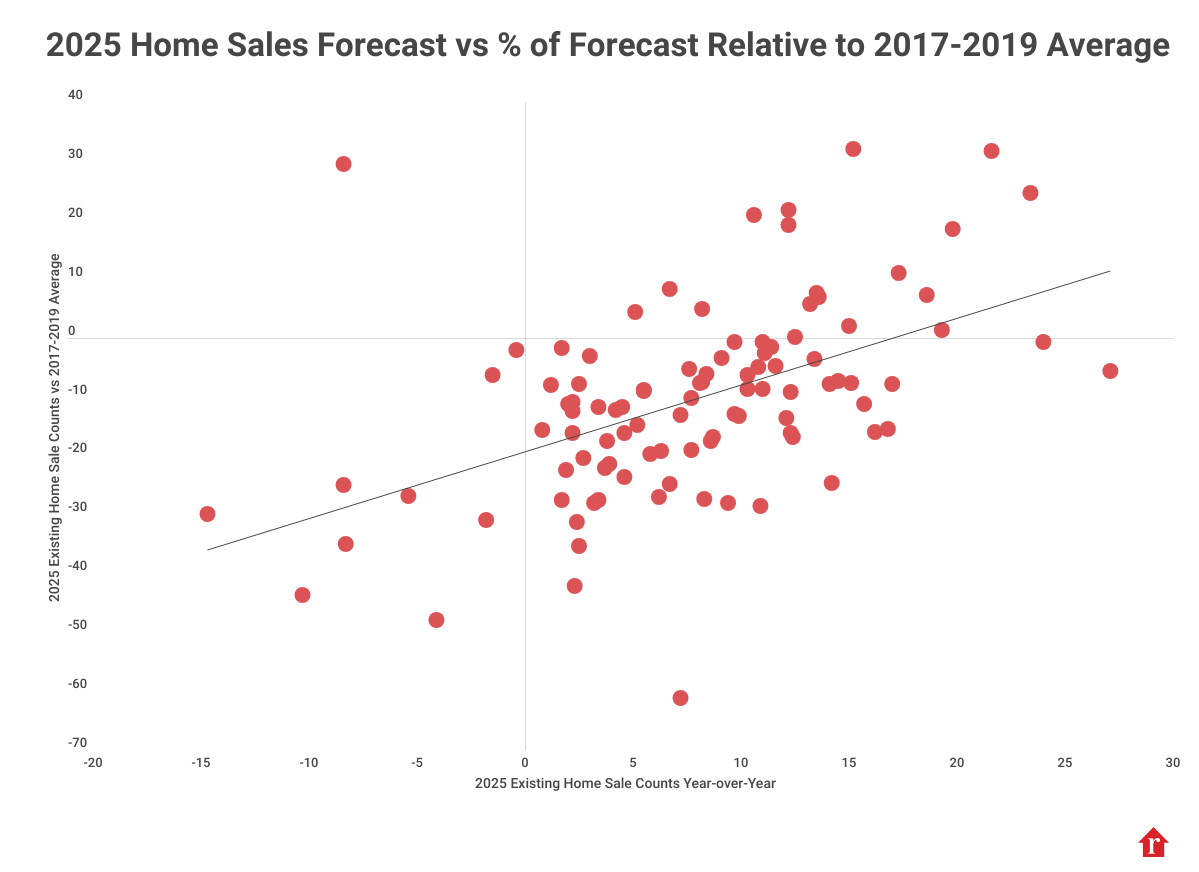Realtor.com made its predictions about the top real estate markets in the U.S. in 2025, with unpredictability sweeping across the housing industry. They forecast buyers won’t be in the mood to take too many risks, championing less-expensive markets on an economic upswing. The information is a good indication of where flippers and landlords would do well to invest.
Surprisingly, the top 10 markets for 2025 are exclusively in the South and West. In rank order, they are:
- Colorado Springs, Colorado
- Miami-Fort Lauderdale-Pompano Beach, Florida
- Virginia Beach-Norfolk-Newport News, Virginia-North Carolina
- El Paso, Texas
- Richmond, Virginia
- Orlando-Kissimmee-Sanford, Florida
- McAllen-Edinburg-Mission, Texas
- Phoenix-Mesa-Chandler, Arizona
- Atlanta-Sandy Springs-Alpharetta, Georgia
- Greensboro-High Point, North Carolina
Danielle Hale, chief economist at Realtor.com, said:
“While nationwide home sales are expected to see a slight uptick this year, driven by a cooling in home price growth, the top markets we’ve identified are poised for stronger sales and price gains in 2025. With mortgage rates likely to ease only modestly next year, these markets—offering relatively lower-priced homes, more new and existing houses to choose from, and mortgage products designed to give buyers a leg up—could provide some would-be buyers a better chance at entering the market next year.”
Affordability and Flexibility Are Determining Factors
Sunbelt markets in the South and West—mainly Texas, Florida, and Virginia—dominate due to lower home prices than the national average. Although homeowners spend just over 30% of their income on housing in these markets (31.1%)—with 30% being the threshold that determines households being cost-burdened—incomes and the cost of living are generally lower in these areas, too. In McAllen, Texas, the most affordable city, the cost of living is 13% below the national average.
However, not all these cities are cheap to live in, with Miami residents spending 42.1% of their income on housing. The cost of living here is 11.5% above the national average. But despite bad press about climate change and high-priced real estate, according to the Census Bureau, Miami was one of the fastest-growing cities in the U.S. in 2022-2023, and there is no reason to believe that will stop in 2025—this means demand for housing will remain high.
It’s also interesting to note that even as workers at major companies and federal employers have been mandated to head back to the office, cities, where hybrid work is popular with homebuyers, are amongst the top places to live. Indeed, 50% of the markets in Realtor.com’s list have a higher share of fully remote or hybrid online job postings in 2024 compared with the average share across the top 100 metros:
- Richmond, Virginia (11.8%)
- Atlanta (10.8%)
- Phoenix (10.6%)
- Colorado Springs, Colorado (8.9%)
- Orlando, Florida (8.8%)
Sellers Are Getting Off the Fence
An influx of inventory in the Sunbelt has been well-documented over the last year. The South and West led the way, with the number of new homes for sale in November hitting pre-pandemic numbers and outscoring the Midwest and Northeast. Despite the deluge of new home construction, which tended to be smaller and more affordable, much of the activity in eight of the top 10 markets is due to homeowners realizing that they can no longer rely on reduced interest rates and deciding to list their home, creating fluidity in the market.

This will create a golden opportunity for flippers and BRRRR investors, especially in more affordable cities where home prices make cash flow and profits more realistic than elsewhere.
Progressive, Diverse, Family-Friendly Cities Are the Most Dynamic
Cities with a younger, diverse population—an above-average number of residents younger than 35—are overwhelmingly where people want to live. These cities also tend to be where families move compared to the national average.
These markets are also diverse, containing 17.6% of foreign-born residents, compared to an average of 13% in the largest metros. Florida and Texas skew this number even more, with Florida at a 21% immigrant population and Texas at 17%, according to Census numbers.
In addition, 1 in 7 households in these cities also has an active-duty military member, higher than the average of 1 in 8. This last statistic is important for investors—particularly flippers—as it means potential homeowners could qualify for a no-money-down VA loan.
Government Loans Spur Homebuying for Younger Residents
It’s not just VA loans that enable younger buyers to get a foot on the property-owning ladder. FHA and USDA loans are also helping fuel sales in top markets thanks to no- or low-down payment requirements. This, coupled with generally more affordable prices in these markets, makes homeownership more realistic than elsewhere.
Realtor.com reports that over half of recent mortgages were government loans in Colorado Springs, Colorado; El Paso, Texas; and Virginia Beach, Virginia—the latter, which has a naval base, had a high percentage of VA loans.
Final Thoughts
Unless you are sitting on a pile of cash and can afford to be in pricey coastal cities, investors want to be in affordable, middle-class markets where houses are selling, and people are moving—with job growth and a younger demographic. In 2025, these areas look to be in the South and West.
For flippers, markets like Richmond have many older homes and established neighborhoods ripe for flipping. Younger, progressive residents in modern tech jobs tend to be drawn to older homes with character and modern makeovers rather than mass-produced, cookie-cutter new developments.
Similarly, landlords and BRRRR investors should be where housing is relatively cheap, with a high percentage of decent-paying jobs. Cities with heavy military populations, such as Virginia Beach, tick this box, as do Colorado Springs, Richmond, Atlanta, and Greensboro, which have newer tech jobs, colleges, and high commutability.
Find the Hottest Markets of 2024!
Effortlessly discover your next investment hotspot with the brand new BiggerPockets Market Finder, featuring detailed metrics and insights for all U.S. markets.

Note By BiggerPockets: These are opinions written by the author and do not necessarily represent the opinions of BiggerPockets.
